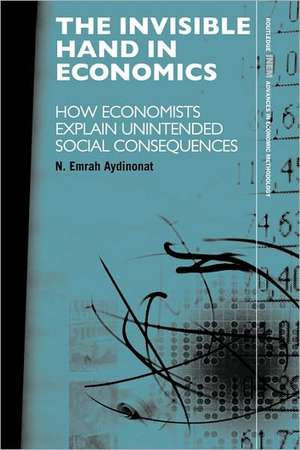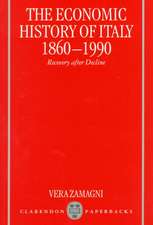The Invisible Hand in Economics: How Economists Explain Unintended Social Consequences: Routledge INEM Advances in Economic Methodology
Autor N. Emrah Aydinonaten Limba Engleză Paperback – 24 noi 2009
The book questions, examines and explicates the strengths and weaknesses of invisible-hand explanations concerning the emergence of institutions and macro-social structures, from a methodological and philosophical perspective. Aydinonat analyses paradigmatic examples of invisible-hand explanations such as Carl Menger’s ‘Origin of Money’ and Thomas Schelling’s famous checkerboard model of residential segregation in relation to contemporary models of emergence of money and segregation. Based on this analysis, he provides a fresh look at the philosophical literature on models and explanation and develops a philosophical framework for interpreting invisible-hand type of explanations in economics and elsewhere. Finally, the author applies this framework to recent game theoretic models of institutions and outlines the way in which they should be evaluated.
| Toate formatele și edițiile | Preț | Express |
|---|---|---|
| Paperback (1) | 486.42 lei 6-8 săpt. | |
| Taylor & Francis – 24 noi 2009 | 486.42 lei 6-8 săpt. | |
| Hardback (1) | 1061.93 lei 6-8 săpt. | |
| Taylor & Francis – 14 feb 2008 | 1061.93 lei 6-8 săpt. |
Din seria Routledge INEM Advances in Economic Methodology
-
 Preț: 163.04 lei
Preț: 163.04 lei -
 Preț: 278.18 lei
Preț: 278.18 lei -
 Preț: 412.37 lei
Preț: 412.37 lei - 26%
 Preț: 821.10 lei
Preț: 821.10 lei - 28%
 Preț: 821.10 lei
Preț: 821.10 lei - 18%
 Preț: 996.83 lei
Preț: 996.83 lei - 22%
 Preț: 324.16 lei
Preț: 324.16 lei -
 Preț: 420.85 lei
Preț: 420.85 lei -
 Preț: 407.78 lei
Preț: 407.78 lei - 17%
 Preț: 270.01 lei
Preț: 270.01 lei -
 Preț: 432.34 lei
Preț: 432.34 lei - 16%
 Preț: 265.60 lei
Preț: 265.60 lei - 14%
 Preț: 312.43 lei
Preț: 312.43 lei - 19%
 Preț: 265.79 lei
Preț: 265.79 lei -
 Preț: 389.38 lei
Preț: 389.38 lei -
 Preț: 384.48 lei
Preț: 384.48 lei -
 Preț: 370.28 lei
Preț: 370.28 lei - 18%
 Preț: 996.33 lei
Preț: 996.33 lei -
 Preț: 408.88 lei
Preț: 408.88 lei -
 Preț: 413.37 lei
Preț: 413.37 lei -
 Preț: 484.47 lei
Preț: 484.47 lei -
 Preț: 406.05 lei
Preț: 406.05 lei -
 Preț: 390.80 lei
Preț: 390.80 lei -
 Preț: 386.39 lei
Preț: 386.39 lei - 18%
 Preț: 947.90 lei
Preț: 947.90 lei - 31%
 Preț: 764.20 lei
Preț: 764.20 lei
Preț: 486.42 lei
Nou
Puncte Express: 730
Preț estimativ în valută:
93.09€ • 96.83$ • 76.85£
93.09€ • 96.83$ • 76.85£
Carte tipărită la comandă
Livrare economică 14-28 aprilie
Preluare comenzi: 021 569.72.76
Specificații
ISBN-13: 9780415569545
ISBN-10: 0415569540
Pagini: 272
Ilustrații: 16 b/w images, 12 tables and 16 line drawings
Dimensiuni: 156 x 234 x 14 mm
Greutate: 0.39 kg
Ediția:1
Editura: Taylor & Francis
Colecția Routledge
Seria Routledge INEM Advances in Economic Methodology
Locul publicării:Oxford, United Kingdom
ISBN-10: 0415569540
Pagini: 272
Ilustrații: 16 b/w images, 12 tables and 16 line drawings
Dimensiuni: 156 x 234 x 14 mm
Greutate: 0.39 kg
Ediția:1
Editura: Taylor & Francis
Colecția Routledge
Seria Routledge INEM Advances in Economic Methodology
Locul publicării:Oxford, United Kingdom
Public țintă
Postgraduate and UndergraduateCuprins
1. Introduction 2. Unintended Consequences 3. The Origin of Money 4. Segregation 5. The Invisible Hand 6. The Origin of Money Reconsidered 7. Models and Representation 8. Game Theory and Conventions. Conclusion
Notă biografică
N. Emrah Aydinonat is Lecturer in philosophy of economics and economic growth at Ankara University, Turkey.
Recenzii
'This is a significant contribution to the philosophy of social science which will also engage the interest of reflective economic theorists'.
- Robert Sugden, University of East Anglia, UK
'The book is a candidate to become compulsory reading for methodologists and philosophers of science, as well as for those economists who take seriously the issue of their models’ epistemological foundations'.
- Nicola Giocoli, University of Pisa, Italy
'This is a book that cannot fail to provoke thoughtful reactions from its readers about the potentialities of explanation in economics'.
- Mark Blaug, Erasmus University, Erasmus Journal for Philosophy and Economics
'In many ways, this book represents philosophy of economics at its finest. It is impeccably informed on the present state of economics, sensitive to the history of the discipline and full of interesting and thoughtful philosophical analysis'.
- Economics and Philosophy Journal
'The book’s choice of the topic with which economists and philosophers could start engaging each other cannot be improved on. The notion of the invisible hand, and the type of explanations it gives rise to, of social patterns of behavior as unintended consequences of individual actions and interactions, are just right for the cross-fertilization between a variety of philosophical fields, prominently including the philosophy of science, on one side, and economic theory, prominently including game theory, on the other. Moreover, the experience of reading this book leaves the reader feeling that the choice of author for this undertaking can hardly be improved on either. Trained both in economics and in philosophy, Emrah Aydinonat has formal and technical skills as well as a historical sensibility and a keen intellectual curiosity, and he has the tenacity to go on digging for gem-stones where previous visitors to the same terrain seem content with surface pebbles. Setting himself the task of developing a framework capable of making sense of the marketplace of extant models, and then to use this framework to ‘gain new insights into the contemporary literature that characterizes institutions and macro-social structures as unintended consequences of human action’ (p. 7), he has produced a book that is pleasingly disciplined and well organized'.
- Edna Ullmann-Margalit; Journal of Economic Methodology, Vol. 17, No. 1, March 2010, 77–92
- Robert Sugden, University of East Anglia, UK
'The book is a candidate to become compulsory reading for methodologists and philosophers of science, as well as for those economists who take seriously the issue of their models’ epistemological foundations'.
- Nicola Giocoli, University of Pisa, Italy
'This is a book that cannot fail to provoke thoughtful reactions from its readers about the potentialities of explanation in economics'.
- Mark Blaug, Erasmus University, Erasmus Journal for Philosophy and Economics
'In many ways, this book represents philosophy of economics at its finest. It is impeccably informed on the present state of economics, sensitive to the history of the discipline and full of interesting and thoughtful philosophical analysis'.
- Economics and Philosophy Journal
'The book’s choice of the topic with which economists and philosophers could start engaging each other cannot be improved on. The notion of the invisible hand, and the type of explanations it gives rise to, of social patterns of behavior as unintended consequences of individual actions and interactions, are just right for the cross-fertilization between a variety of philosophical fields, prominently including the philosophy of science, on one side, and economic theory, prominently including game theory, on the other. Moreover, the experience of reading this book leaves the reader feeling that the choice of author for this undertaking can hardly be improved on either. Trained both in economics and in philosophy, Emrah Aydinonat has formal and technical skills as well as a historical sensibility and a keen intellectual curiosity, and he has the tenacity to go on digging for gem-stones where previous visitors to the same terrain seem content with surface pebbles. Setting himself the task of developing a framework capable of making sense of the marketplace of extant models, and then to use this framework to ‘gain new insights into the contemporary literature that characterizes institutions and macro-social structures as unintended consequences of human action’ (p. 7), he has produced a book that is pleasingly disciplined and well organized'.
- Edna Ullmann-Margalit; Journal of Economic Methodology, Vol. 17, No. 1, March 2010, 77–92
Descriere
Addressing the controversial concept of the invisible hand, this book questions, examines and explicates the strengths and weaknesses of the concept by analyzing its paradigmatic examples such as Carl Menger’s Origin of Money and Thomas Schelling’s famous checkerboard model of residential segregation.















